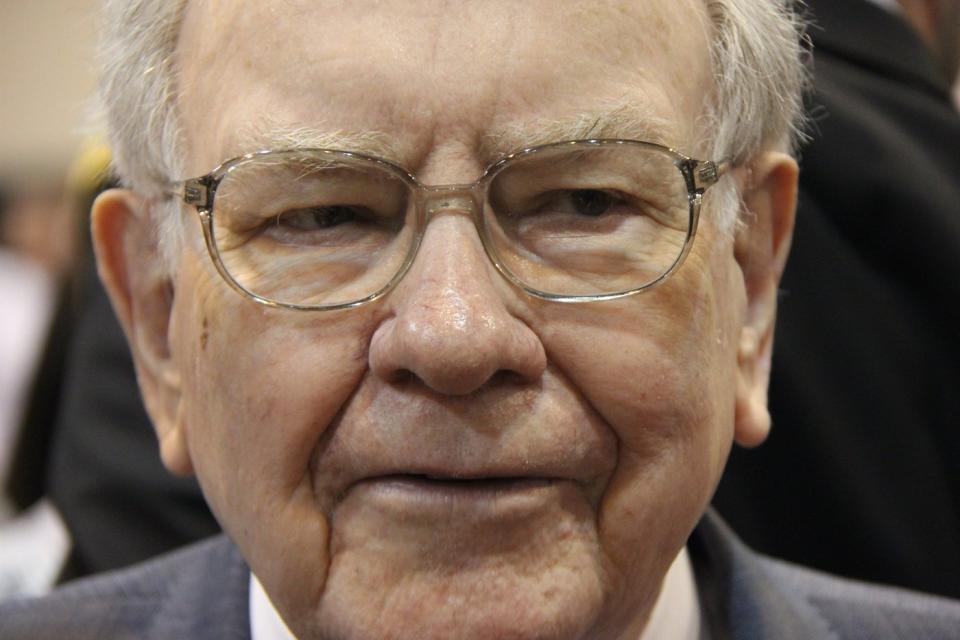If you’ve ever wondered why Wall Street continually sings the praises of Berkshire Hathaway (NYSE: BRK.A)(NYSE: BRK.B) CEO Warren Buffett, look no further than his track record as an investor since becoming CEO in the mid-1960s. He’s practically doubled up the annualized total return, including dividends, of the benchmark S&P 500 spanning nearly six decades and has overseen an aggregate return in his company’s Class A shares (BRK.A) of 4,504,012% as of the closing bell on Jan. 22, 2024.
However, the Oracle of Omaha isn’t infallible. Although riding his coattails over multiple decades has been a bona fide moneymaking strategy, there have been some dud investments from him and his investment team along the way.
As we push ahead into 2024, three of the roughly 50 stocks currently held in Berkshire Hathaway’s $368 billion investment portfolio are companies I wouldn’t touch with a 10-foot pole.

Snowflake
The first Buffett stock I want nothing to do with in the new year is none other than the cloud-based data warehousing company Snowflake (NYSE: SNOW).
Even though I’m not a fan of Snowflake (the reasoning of which I’ll get to in a moment), I can appreciate its well-defined competitive advantages. We’re still in the relatively early stages of enterprise cloud spending ramping up, which means Snowflake is liable to easily sustain a double-digit growth pace throughout the remainder of the decade.
More importantly, Snowflake’s cloud infrastructure is built atop the most popular cloud infrastructure service platforms. Whereas sharing data can be difficult among competing cloud services, Snowflake members can easily do so.
I’ll also add that Snowflake’s pay-as-you-go model, which shuns subscription fees in favor of charging customers based on the data they store, is clearly encouraging businesses to utilize its services.
The reasons I’m out on Snowflake in 2024 are threefold. First, I expect the U.S. to enter a recession at some point this year. I’m basing this on a couple of money-based metrics that have historically correlated strongly with downturns in the U.S. economy. A recession would be expected to slow spending across the board for tech companies, at least temporarily.
Secondly, the Snowflake investment story has long been about its outsize growth rate. Over the past three years, year-over-year product revenue growth has fallen from 102% in fiscal 2022 (ended Jan. 31, 2022) to an estimated 35% in fiscal 2024. Mind you, I’m not saying Snowflake’s growth story is over. Rather, I’m pointing out that its outsize valuation premium is no longer warranted, especially with sales growth forecast to slide to 30% in fiscal 2025, according to Wall Street’s consensus.
The third reason I’m avoiding Snowflake in 2024 is its valuation. It’s currently valued at a multiple of 176 times Wall Street’s consensus earnings for the coming fiscal year, with a slowing growth rate. While I’m willing to afford Snowflake some level of valuation premium for its competitive advantages, this is excessive.
Kraft Heinz
The second Warren Buffett stock I won’t be touching with a 10-foot pole in 2024 is brand-name packaged foods and condiments company Kraft Heinz (NASDAQ: KHC). You’ll note that I’m not just picking on growth stocks.
Similar to Snowflake, Kraft Heinz does have a few redeeming qualities. For one, it’s a consumer staples stock. This is to say that it provides basic needs goods (i.e., food) that consumers will buy regardless of how well or poorly the U.S. economy performs. Consumer staples stocks are typically known for their market-topping dividend yields and somewhat consistent operating cash flow.
Something else Kraft Heinz brings to the table is its portfolio of well-known brands. In addition to the obvious, Kraft and Heinz, it’s behind popular brands like Oscar Mayer, Velveeta, Jell-O, Philadelphia, and Kool-Aid. Brand-name products give Kraft Heinz the confidence to raise its prices and stay ahead of the inflationary curve.
However, these competitive edges for Kraft Heinz are trumped by two big concerns.
To begin with, the company’s operating results show a multiquarter decline in volume/mix. This suggests that consumers are becoming more price-sensitive in the wake of historically high inflation and have begun to trade down to cheaper store-branded goods. Although Kraft Heinz has enjoyed exceptional pricing power, a decline in volume/mix implies a challenging growth environment.
The other issue for Kraft Heinz is the company’s debt- and goodwill-laden balance sheet. It closed out September with $19.9 billion in long-term debt, compared to $1.05 billion in cash and cash equivalents. While it remains cash-flow positive, there’s not a lot of capital left over for Kraft Heinz to reignite interest in its brands.
It’s also lugging around $30.3 billion in goodwill, which could be written down in a similar fashion to the $15.4 billion writedown taken in February 2019.
Despite a reasonably low forward price-to-earnings (P/E) ratio of 12, Kraft Heinz’s balance sheet and stagnant growth make it an easy stock to avoid in the new year.

Apple
The third Warren Buffett stock I wouldn’t touch with a 10-foot pole in 2024 is Apple (NASDAQ: AAPL). It’s also the largest holding in Berkshire Hathaway’s portfolio — over 48% of invested assets — so please don’t forward this article to the Oracle of Omaha.
To keep with the theme, Apple brings plenty of sustained operating advantages to the table. It’s consistently viewed as the world’s most valuable brand and has an exceptionally loyal following of customers. But Apple’s biggest advantage is steeped in its innovation.
It’s consistently accounted for around half of all U.S. smartphone market share since introducing 5G-capable versions of its iPhone during the fourth quarter of 2020. Further, CEO Tim Cook is overseeing the steady transformation of Apple into a platforms company. A subscription-driven operating model should lift the company’s operating margin, smooth out revenue fluctuations during major iPhone replacement cycles, and keep consumers loyal to the company’s ecosystem of products and services.
I’d be remiss if I didn’t mention Apple’s market-leading capital-return program as well. It’s repurchased more than $600 billion worth of its common stock since introducing a share buyback program in 2013. A declining outstanding share count has had a positive impact on the company’s earnings per share (EPS).
The problem with Apple and the primary reason I’m not touching this stock in 2024 is that its growth engine has stalled. In fiscal 2023 (ended Sept. 30), sales for all its physical product segments (iPhone, Mac, iPad, and Wearables) fell from the prior-year period.
What’s even more noteworthy about this decline is that Apple’s nearly 3% year-over-year sales slump occurred with inflation well above its historic average. Despite the incredible brand loyalty of its customers, Apple’s sales still declined in fiscal 2023.
It’s a similar story for Apple’s profits. Although EPS crept higher by a penny, thanks to the company’s aggressive share repurchase program, net income fell $2.8 billion to $97 billion.
The investment thesis for Apple has always hinged on a brand-name company delivering outsize growth for its size. It’s why investors haven’t batted an eye when paying 20 or 25 times forward-year earnings for one of the largest publicly traded companies. But without its trademark growth, Apple’s forward year P/E of 27 is historically high.
Although Warren Buffett’s company has made a veritable fortune investing in Apple, I don’t expect 2024 to be a particularly good year for the tech giant.
Should you invest $1,000 in Snowflake right now?
Before you buy stock in Snowflake, consider this:
The Motley Fool Stock Advisor analyst team just identified what they believe are the 10 best stocks for investors to buy now… and Snowflake wasn’t one of them. The 10 stocks that made the cut could produce monster returns in the coming years.
Stock Advisor provides investors with an easy-to-follow blueprint for success, including guidance on building a portfolio, regular updates from analysts, and two new stock picks each month. The Stock Advisor service has more than tripled the return of S&P 500 since 2002*.
*Stock Advisor returns as of January 22, 2024
Sean Williams has no position in any of the stocks mentioned. The Motley Fool has positions in and recommends Apple, Berkshire Hathaway, and Snowflake. The Motley Fool recommends Kraft Heinz. The Motley Fool has a disclosure policy.
3 Warren Buffett Stocks I Wouldn’t Touch With a 10-Foot Pole in 2024 was originally published by The Motley Fool
Source: finance.yahoo.com
